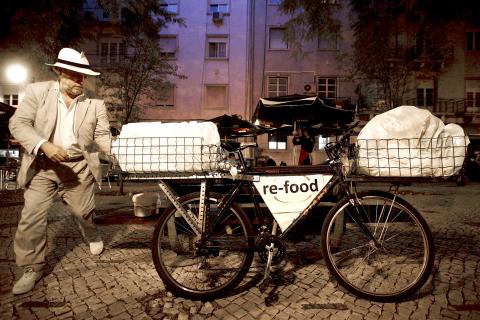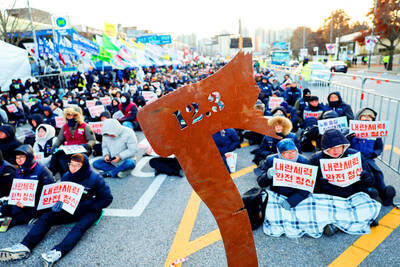Donning a pale blue suit, white Panama hat and matching trainers, Hunter Halder hops on his bicycle — as he does every night — and starts his tour of Lisbon restaurants picking up each chef’s leftover food to distribute among those hardest hit by the country’s economic crisis.
On the capital’s posh Conde de Valbom avenue, the 60-year-old American, riding his blue bike with its front and rear baskets, has become a familiar fixture. Restaurant owners welcome him with a smile.
In each place, plastic containers filled with potatoes, rice, durum wheat, semolina, soups and meat are lined up waiting on the counter. Halder stops off to fill up his baskets, waves a quick greeting and then gets back in the saddle.

Photo: AFP
“Every restaurant in the world tries to make just the right amount of food and sell it off,” he said, explaining the idea behind the venture which he started in March. “Sometimes they do that, but it’s rare. The normal thing is there is something left over and when we put it altogether it’s a lot of food and that’s the food that the people need.”
Halder christened the idea behind his project “Re-Food,” which is short for “rescuing good food.”
“I decided not to continue to work for money, but to work for a humanitarian project of my own design. I launched Re-Food because of the urgency of the crisis. When I began the project, I was alone,” he said.
However, the idea quickly caught on. Eighty volunteers now lend him a helping hand and 30 restaurants have opened their doors to the project.
For six months, Re-Food did not receive any outside funding, but last month Halder’s project won a competition organized by the Montepio bank to find the best example of community service. He received a 25,000 euro (US$34,000) reward.
“What Hunter does is very important in these times of crisis,” said Alexandra Silva, a volunteer who lets the American use premises which serve him as a small office.
These are crisis times indeed: The government estimates that Portugal’s economy will shrink 2.8 percent next year, while the EU puts the downturn at 3 percent, which would make the country the worst-performing in the 17-nation eurozone.
Portugal followed Greece and Ireland in needing a bailout and its progress in reducing its public deficit is now regularly reviewed to decide whether or not its next 8 billion euro loan installment will be cleared.
The government also expects unemployment to top 13.4 percent next year.
About 700,000 Portuguese are currently without a job, according to official figures, and more than half of them receive no state help, prompting the government to draw up a “social emergency plan” to assist the neediest.
The growing success of Re-Food helps ensure that at least some of Lisbon’s residents have one basic need met.
Once he has collected the leftovers, Halder, who has lived in Portugal for 20 years, borrows the car of another volunteer to go and distribute his goods.
In a car park in a suburb on the edge of Lisbon, 20 people are waiting for Halder and help him to hand the containers out.
With the food that he picks up, Halder can feed about 100 people every day.
“It’s not a big impact, but it shows it can be done,” he said.
“I couldn’t live without Hunter. Before I knew him, there were days when I didn’t eat,” said Celeste Castanho, an unemployed 55-year-old who receives only 300 euros a month in benefits for her and her family to survive on.
“Our goal is to make the city of Lisbon the first city in the world to end food waste and feed its hungry people and we believe we can do that in a year or a year-and-a-half,” Halder said. “The final objective is to spread Re-Food in every corner of the planet.”
Halder, who lost the consultant’s job he had held for a number of years, knows as well as anyone that fortunes can change.
However, he said launching Re-Food — albeit a small venture so far — has given him the chance to build up something again.
“I’ve never been so broke and so successful at the same time,” he said, laughing.

Tropical Storm Koto killed three people and left another missing as it approached Vietnam, authorities said yesterday, as strong winds and high seas buffeted vessels off the country’s flood-hit central coast. Heavy rains have lashed Vietnam’s middle belt in recent weeks, flooding historic sites and popular holiday destinations, and causing hundreds of millions of dollars in damage. Authorities ordered boats to shore and diverted dozens of flights as Koto whipped up huge waves and dangerous winds, state media reported. Two vessels sank in the rough seas, a fishing boat in Khanh Hoa province and a smaller raft in Lam Dong, according to the

The pledge by Japanese Prime Minister Sanae Takaichi to “work, work, work, work and work” for her country has been named the catchphrase of the year, recognizing the effort Japan’s first female leader had to make to reach the top. Takaichi uttered the phrase in October when she was elected as head of the ruling Liberal Democratic Party (LDP). Many were initially as worried about her work ethic as supportive of her enthusiasm. In a country notorious for long working hours, especially for working women who are also burdened with homemaking and caregiving, overwork is a sensitive topic. The recognition triggered a

Sri Lanka made an appeal for international assistance yesterday as the death toll from heavy rains and floods triggered by Cyclone Ditwah rose to 123, with another 130 reported missing. The extreme weather system has destroyed nearly 15,000 homes, sending almost 44,000 people to state-run temporary shelters, the Sri Lankan Disaster Management Centre (DMC) said. DMC Director-General Sampath Kotuwegoda said relief operations had been strengthened with the deployment of thousands of troops from the country’s army, navy and air force. “We have 123 confirmed dead and another 130 missing,” Kotuwegoda told reporters in Colombo. Cyclone Ditwah was moving away from the island yesterday and

‘HEART IS ACHING’: Lee appeared to baffle many when he said he had never heard of six South Koreans being held in North Korea, drawing criticism from the families South Korean President Lee Jae-myung yesterday said he was weighing a possible apology to North Korea over suspicions that his ousted conservative predecessor intentionally sought to raise military tensions between the war-divided rivals in the buildup to his brief martial law declaration in December last year. Speaking to reporters on the first anniversary of imprisoned former South Korean president Yoon Suk-yeol’s ill-fated power grab, Lee — a liberal who won a snap presidential election following Yoon’s removal from office in April — stressed his desire to repair ties with Pyongyang. A special prosecutor last month indicted Yoon and two of his top